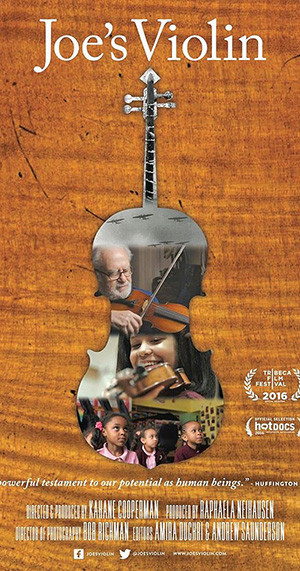
Reviewing: “Joe’s Violin,” directed by Emmy-award winning filmmaker Kahane Cooperman, premiering on PBS on Monday, July 24, at 10 p.m. View online at pov.org.
There are few stories more heartwarming and sweet, charmingly simple yet emotionally deep, than that of the unexpected bond between Joe Feingold and Brianna Perez. At first glance, the two would seem unlikely to meet: Joe, a 91-year-old Holocaust survivor, and Brianna, a 12-year-old schoolgirl from the poorest congressional district of the Bronx. What brought them together was a seemingly small act, when Joe donated his beloved violin to an organization that distributes musical instruments to schools, and it ended up in Brianna’s young hands.
Brianna, a passionate violinist with an inquisitive nature, soon realized that she was the recipient of much more than just a musical instrument. Joe’s violin had a rich and bittersweet history that she was eager to learn more about. Born in Poland, Joe grew up in a family that shared a deep love for music. Encouraged by his mother, he was devoted to his violin playing. After the war broke out, he carried these precious memories with him through many years of separation and pain. It was these memories that spurred him, while he was in a displaced persons camp, to spend his limited resources on a violin, which he would treasure for many years before passing it on.
The telling of both Brianna’s and Joe’s stories is masterfully done, as the Oscar-nominated film weaves seamlessly between present and past, pain and hope, light and darkness. Pictures and videos of Joe’s family before and during the war complement his emotional narration, while modern footage documents Brianna’s life and perspective. The unlikely similarities between them are gently highlighted as their respective stories unfold, as both find happiness and strength in the face of unspeakable hardship through their music.
“Joe’s Violin” possesses the rare ability to be uplifting and moving in a subtle and not overly dramatic way. This can be seen in the quiet, understated dispositions of the subjects and tasteful instrumental background in several of the most meaningful scenes, such as when Brianna receives the violin, or when she plays for Joe for the first time. The dialogue reflects this as well, as it is simple and unpretentious; emotional intensity in the film comes not from words, but from the pauses, the moments of reflection and nostalgia and, of course, from the haunting notes of the violin, both from Joe’s shaky hands and Brianna’s steady ones. As French author and poet Victor Hugo famously said, “Music expresses that which cannot be said and on which it is impossible to be silent.”
The beautiful symbolism of the violin is one aspect that truly makes the documentary a work of art, effortlessly tying the stories and subjects together. It represents both Joe’s and Brianna’s salvation from a world of hardship and pain. As the principal of Brianna’s school, which teaches music to children from broken homes and difficult backgrounds, said, her students are, in their own way, “survivors.” When Brianna plays, the camera pans over her face to show a sense of serenity and contentment passing over her, as for these moments she escapes from any struggle or worry that may have been on her mind. And when Joe listens, immersed in the music, his face reflects this as well, as he is transported back to when that very violin provided him comfort in his darkest times.
Many Holocaust documentaries focus mainly on heart-wrenching footage of destruction and death. “Joe’s Violin” represents an important category of Holocaust-related films that do not just mourn those who suffered or were lost, but also celebrates their lives and maintains their legacies. In a time when the numbers of Holocaust survivors are dwindling, this film shows how one little girl’s decision to reach out and connect to a survivor could profoundly impact both of their lives, and how there is so much more to a person’s story than the measure of their losses; there is love, music and light, if you know where to look.
In only 24 minutes, the film manages to immerse the viewer in Joe’s tragic past while, through Brianna’s youthful lens, keeps the focus on a bright and hopeful future. This unique combination of a harrowing survival story with a feel-good, life-affirming message makes for a film that is touching, enjoyable and altogether a valuable watch.
By Rachel Retter
Rachel Retter, a recent graduate of Manhattan High School for Girls, is a Jewish Link summer intern and contributor.










